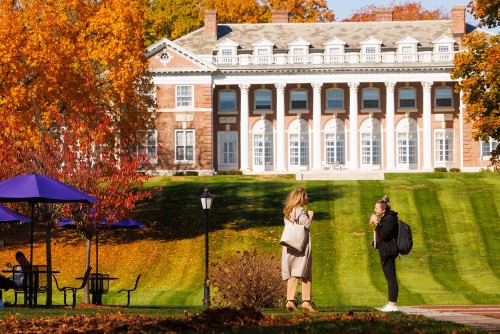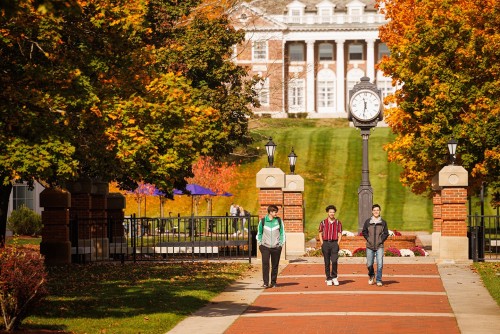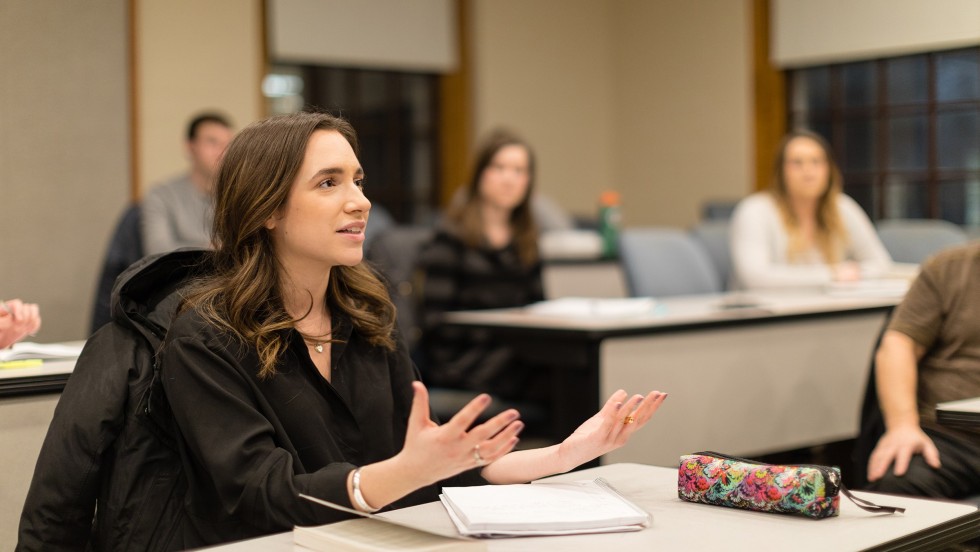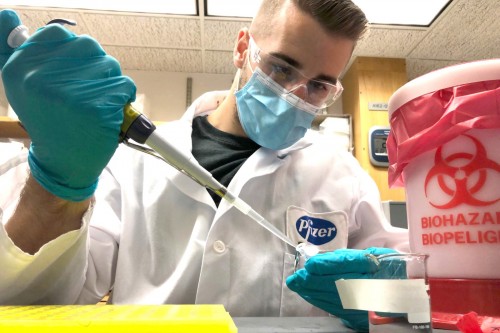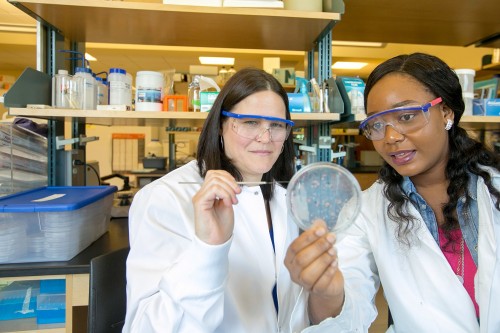Biology Major & Minor
The Stonehill Biology program prepares students for life sciences graduate programs and professional programs in medical, allied health and environmental fields. It also prepares graduates for direct entry into the workforce.
The Role Model and Mentor Behind Countless Successful Science Careers
For more than 20 years, Dr. Marsha A. Moses ’75 has welcomed Stonehill science students and grads to her Boston Children’s Hospital lab. The impact has been profound.
Excellent Scientists Strengthened by Broadened Perspectives
The Biology Department at Stonehill College is committed to providing comprehensive and rigorous biology training in the context of a liberal arts education. We strive to thoroughly prepare students for careers and advanced education in the biological sciences by offering excellent classroom learning augmented by meaningful research experiences. Our faculty members are committed to providing individual attention to each of our students and to give them the opportunity to pursue their interests in the many facets of biology.
Three Degree Options to Suit Your Goals
The B.S. in Biology fulfills entrance requirements for medical, dental and graduate schools and for medical technology programs. It is also recommended for careers in research, academia, allied health fields, private enterprise or government service.
Students completing the B.S. in Biology sequence and their General Education courses will graduate with a solid foundation in biological science and a broad educational background. Students enrolled in the major are encouraged to strengthen their career preparation by completing an internship, directed study or research project before graduation.
The B.A. in Biology is designed for a student who seeks entry into a professional program or to teach at the primary or secondary level. The B.A. in Biology may also be combined with another major to create an interdisciplinary degree appropriate for direct employment in biotechnology, government or other industry positions.
Combined with journalism or English, it makes it possible to pursue a career in science writing or editing; with computer information systems, technical and development work for biotechnology and pharmaceuticals; with public administration or political science, a career in environmental non-profit or governmental sectors; or with business, a career in marketing or the patent office with biotechnology or pharmaceutical companies.
The B.A. in Biology is also recommended for those seeking entry into post-baccalaureate training/certification courses or interdisciplinary graduate programs such as those in public health or natural resources. Students enrolled in the major are encouraged to strengthen their career preparation by completing an internship, directed study or research project.
The Biology minor provides a broad introduction to the biological sciences for students majoring in other disciplines. A variety of courses are available to help students whose long-term goals would be enhanced by knowledge of biology (for example, careers or graduate study in fields such as biotechnology, biophysics, anthropology, clinical psychology, public policy, healthcare administration or genetic counseling). Courses used to fulfill requirements for the minor should be selected with the help of the Biology minor advisor or another advisor in the department.
Stonehill has taught me to trust in myself even when the odds are against me, to be able to persevere with determination and courage to achieve my goals.
Three Things You Need to Know About the Program
Large Program, Yet Small Classes
Biology is one of the largest majors at Stonehill, encompassing nearly a quarter of the student population, and yet its small class sizes ensure students get the support they need to succeed.
Tailored to Suit Your Goals
Students completing the major are prepared for entry into graduate programs in the life sciences and professional programs in medical, allied health and environmental fields.
The biology major also prepares graduates for direct entry into clinical, industrial, research, teaching or government careers. Because the curriculum is part of a liberal arts degree, biology majors also have the option of pursuing a wide variety of non-science careers.
Connects Latest Technology with Time-Tested Practices
The College supports the Biology Department’s effort to remain current in fields where rapid technological and theoretical advances have become the norm. The Department is committed to incorporating the best of the new into its curriculum without neglecting the classical areas of biology, which remain critical to a broad, liberal arts-based education in the life sciences.
Studying biology at Stonehill puts students in an 89,000-square-foot state-of-the-art science center, and has them working with accomplished faculty using equipment normally only available to graduate students.
Recent Accolades
Organizations involved in assessing U.S. colleges and universities continually cite Stonehill as being among the best in the nation when it comes to value, outcomes and a commitment to making the world a better place. See full list of accolades.
-
U.S. News Ranks Stonehill in the Top 5% Nationally
After assessing U.S. colleges and universities based on 17 measures of academic quality and graduate outcomes, U.S. News & World Report ranked Stonehill No. 73 in the Best Value category out of 1,500 colleges, while also moving up to No. 83 among National Liberal Arts Colleges.
-
Wall Street Journal 2025 Rankings Place Stonehill Among Best Colleges in U.S.
Stonehill College has been recognized again this year by The Wall Street Journal for the value it provides students, especially in the areas of career preparation and character development.
-
Money Ranks Stonehill Among Best U.S. Colleges in 2024
Money’s 2024 Best U.S. Colleges research shows Stonehill among top 10% nationwide.
Students work with Heather Yu, assistant professor biology, on the Anatomage virtual dissection table.
Sample Biology Courses
Biology of Cancer
Wetlands: Ecology, Hydrology, Restoration
Where Our Recent Graduate Work
Stonehill’s biology graduates go on to work at a range of notable organizations. Continue exploring where Stonehill graduates work.
By the Numbers
The Biology program prepares students to pursue employment after graduation or continue their education in graduate or professional school.
100% of Class of 2023 biology graduates are employed, enrolled in top graduate programs or engaged in postgraduate service six months after graduation.
The early career salaries for graduates of Stonehill's Biology program are among the top 3% in the field, according to College Factual
Outside Partnerships & Special Programs
Save Money: Earn Two Degrees in as Little as Four Years
Career Development Resources for Students
The Stonehill Career Development Center offers extensive assistance to students seeking employment, pursuing advanced studies or participating in postgraduate service opportunities. By completing internships and utilizing mentors, students are empowered to build lifelong career management skills.
Biology-Specific Career Resources
- Extensive on-campus recruiting program for internships and entry-level jobs
- Annual career fairs
- Various industry-specific career lunches – biotech and pharmaceuticals
- Alumni Career Dinner – Biology Society
- 89 active biology alumni mentors
Related Stories
-

In a poignant reflection of Stonehill’s mission, a number of students and alums are putting their degrees to work in the race for a COVID-19 vaccine.
-

Stonehill's S-Stem Award helps economically disadvantaged students succeed in the sciences.
Bioinformatics learning takes flight during bird research
From bioinformatics and genomic data analysis to Python software, students gain skills that provide a competitive advantage as they pursue careers in science
Have Questions?


